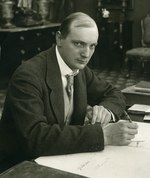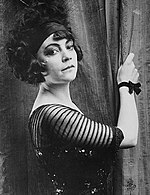The traitor
| Movie | |
|---|---|
| Original title | The traitor |
| Country of production | Germany |
| original language | German |
| Publishing year | 1911 |
| length | 48 minutes |
| Rod | |
| Director | Urban Gad |
| script |
S. von Stein Erich Zeiske as DI Rector |
| production |
German Bioscop for PAGU |
| camera | Guido Seeber |
| occupation | |
| |
Die Verräterin , subtitled war drama from 1870/71 or dramatic war episode , is a German silent film in three acts by Urban Gad from 1911. It is one of the director's fragmentary films.
action
During the Franco-Prussian War : The Prussian lieutenant von Mallwitz receives the order to occupy Bougival Castle with his men. While his men move into quarters in the team room of the castle, Mallwitz is introduced to the lord of the castle, the Marquis de Bougival. He asks the housekeeper to fetch his daughter Yvonne so that she can introduce herself to the lieutenant. Yvonne falls in love with Mallwitz at first sight, but Mallwitz shows no interest in her. She dresses up for dinner, but Mallwitz does not appear at the table. While he visits his men in the team room to check their discipline, Yvonne picks flowers which she distributes in his room. Mallwitz doesn't know who the flowers come from and has them removed by one of his soldiers. Yvonne meets the soldier with her flowers in the corridor of the castle and is offended.
A little later, the relationship between Mallwitz and Yvonne improved. Together they stroll through the greenhouse of the castle and flirt with each other. When a soldier calls out the alarm, Mallwitz thinks about his military duty and leaves Yvonne standing. Yvonne goes to Mallwitz's camp, but is gruffly grabbed by the wrist by an outpost and prevented from moving on. When Mallwitz appears, Yvonne hopes that he will stand up for her in front of the soldier, but Mallwitz only rebukes her and sends her back to the castle. She wants to take revenge on him and seeks out a group of irregulars. She arranges a sign with them so that they can storm the castle. In the evening Mallwitz and the Marquis de Bougival delve into a conversation and the soldiers too are idle. At Yvonne's signal, the soldiers are initially overwhelmed by the troublemakers. Shortly afterwards, Mallwitz is captured by the irregulars. Vujrat, the leader of the irregulars, reveals to Mallwitz that Yvonne betrayed him.
A little later, Yvonne realizes that the irregulars are planning Mallwitz's execution and are already digging his grave (subtitles "That was not what I meant."). Now she tries everything to save Mallwitz and in the end offers herself to Vujrat as lover, should he release Mallwitz. Mallwitz, however, refuses to accept Yvonne's victims. Yvonne now hurries to the Prussian army camp, disguised in Mallwitz's coat and cap. A little later she rides off with the soldiers to save Mallwitz. He is led to the place of execution and is about to be shot by the militants when Yvonne first throws herself into the line of fire and a little later the Prussian soldiers appear and overwhelm the militants. Mallwitz and Yvonne embrace each other. The fatally wounded Vujrat, however, uses the last of his strength to shoot Yvonne, who dies in Mallwitz's arms.
production
The traitor was the fifth film in the Asta Nielsen / Urban Gad series 1911/1912 after The Black Dream , In the Big Moment , Gypsy Blood and The Foreign Bird . It was shot within a week, probably in the summer of 1911 in the Bioscop studio in Berlin. The Potsdam body hussars participated in the film. The buildings of the film were created by Robert A. Dietrich .
The film had its premiere on December 9, 1911. Two incomplete copies of the film are known, in the Nederlands Filmmuseum and in the Stiftung Deutsche Kinemathek .
literature
- The traitor . In: Karola Gramann, Heide Schlüpmann (ed.): Nachtfalter . 2nd Edition. tape 2 of Edition Asta Nielsen, her films . Verlag Filmarchiv Austria, Vienna 2010, ISBN 978-3-902531-83-4 , pp. 49-55 .
Web links
- The traitor in the Internet Movie Database (English)
- The traitor at filmportal.de
- The traitor at the Danske Film Institute

